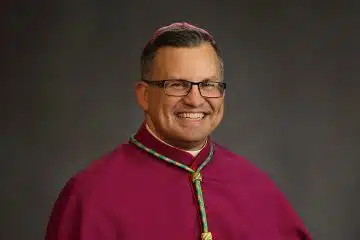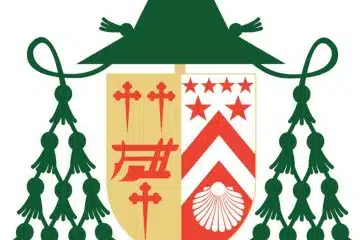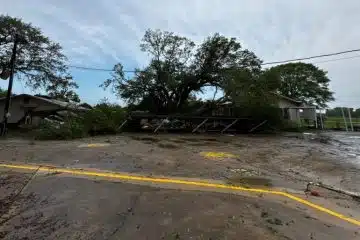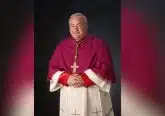Immigrants aren’t getting health care, so parish brings it to them

IMAGE: CNS photo/Sarah Webb, CatholicPhilly
By Gina Christian
NORRISTOWN, Pa. (CNS) — For immigrants in the country without legal permission, a routine doctor’s visit can be an occasion for panic. Without papers, immigrants fear deportation when they enter the waiting room.
Unwilling to take such a risk, they avoid seeking medical attention even in life-threatening cases.
Language barriers that make it difficult to describe their ailments or to understand medical advice, lack of transportation to health care facilities and working long hours at jobs that don’t provide paid time off all add up to many immigrants missing out on vital health care.
St. Patrick Parish in Norristown is working to change this situation with help from local clinicians, volunteers — and Our Lady of Guadalupe.
After the noon Mass on the first Sunday of each month, the parish hosts a walk-in health fair for area residents, many of whom are Mexican immigrants, in the church’s basement hall.
Participants receive free screenings for diabetes, tuberculosis, hypertension, eye and dental conditions.
Pregnant women can also obtain prenatal vitamins and baby boxes sturdy, cardboard cribs designed to prevent SIDS, or sudden infant death syndrome.
The monthly health fair is vital to the local community’s underserved members.
“The people who come here have total and complete trust in the priests,” said Father Gus Puleo, pastor of St. Patrick Parish and an adjunct professor of Spanish at St. Charles Borromeo Seminary. “They always come to me with concerns about immigration and medical matters. I think this trust is due to Our Lady of Guadalupe, who is a major force in the Mexican community. We work with her.”
The parish also works with area medical practitioners who train leaders within the community as “promotores de la salud,” or “health promoters.”
The promotores receive a year of “education and practical training in health and nursing care,” Father Puleo told CatholicPhilly.com, the news website of the Archdiocese of Philadelphia. “They come from the community, and they take ownership of this program.”
Because they are community members, fluent in both the language and the culture of those they assist, the promotores serve as critical links between the program’s clients and health care services.
“Having this here in the church is more confidential, more calming, more convenient,” Carla, a parishioner, said after the most recent health fair at St. Patrick’s April 2. “It’s very necessary to have these services for the Spanish community.”
Prenatal care is key among those services. In 2014, Father Puleo buried five infants who died because of a lack of proper medical attention, and he was determined not to bury any more.
“When I started this program here, I had to learn about pregnancy through scientific research, and I have a better understanding of it now than most biological fathers do,” he said.
Throughout the summer of 2014, he announced the program to his parishioners, and in October 2014, the first screening session was held.
To implement the program in his parish, Father Puleo coordinated with Mercy Sister Ann O’Connell and Jesuit Father Peter Clark, director of the Institute of Clinical Bioethics and a professor of medical ethics at St. Joseph’s University.
Based on health care models he observed in the Dominican Republic, Father Clark had already instituted similar programs for the Nigerian and French-speaking West African communities at St. Cyprian Parish in West Philadelphia.
His team partnered with nearby Mercy Catholic Medical Center, and Sister O’Connell, a retired vice president of mission for what is now Suburban Community Hospital in Norristown, suggested extending the program to the Mexican community in central Montgomery County.
The program has already saved lives. A stroke patient who came to the March clinic was referred immediately to the hospital by a resident helping at the clinic. In another case an ambulance was called to take a man whose eye was hemorrhaging to the hospital, said Father Clark. “These men were both undocumented, so they’re not going to run immediately to the emergency room. But a resident (physician) called ahead, and he knew the residents in the ER, and they just took care of them.”
Any case requiring formal medical treatment is referred to local practitioners and clinics, which often charge on a sliding-scale basis.
“For those patients who do not have insurance, we provide information and ask them to come into our office,” said Dr. Patrice Ekperi, a practitioner at Suburban Community Hospital’s Family Medicine Office. “We can provide treatment services there, and we do offer uninsured rates, so that we can at least attend to those who do not have insurance or who may be underinsured.”
“The hospitals in Philadelphia have been very good,” Father Puleo added. “We pay something, but we try for minimal payment. We rely on clinics. We use our connections.”
The list of agencies willing to help with the program continues to grow. For instance, St. Patrick’s now offers dental health education, thanks to volunteers from Montgomery County Community College’s dental hygiene program.
Students from both the Philadelphia College of Osteopathic Medicine and the Institute of Clinical Bioethics at St. Joseph’s University routinely staff the monthly clinic. A Delaware Valley nonprofit organization, coordinates mammograms and pelvic exams for women at area hospitals.
The Mexican consulate has joined the monthly health fair to assist clients with immigration issues, legal documentation and domestic violence concerns.
By ministering to the medical needs of the underserved, the promotores program also serves as a means of evangelization.
“We’re called to take care of both the spiritual and physical needs of the person,” said Father Puleo. “They’re not separate; they’re one.”
“We walk the talk,” added Sister O’Connell. “It’s not just something preached, but it’s something lived.”
– – –
Christian writes for CatholicPhilly.com, the news website of the Archdiocese of Philadelphia.
– – –
Copyright © 2017 Catholic News Service/U.S. Conference of Catholic Bishops. www.catholicnews.com. All rights reserved. Republishing or redistributing of CNS content, including by framing or similar means without prior permission, is prohibited. You may link to stories on our public site. This copy is for your personal, non-commercial use only. To request permission for republishing or redistributing of CNS content, please contact permissions at [email protected].













